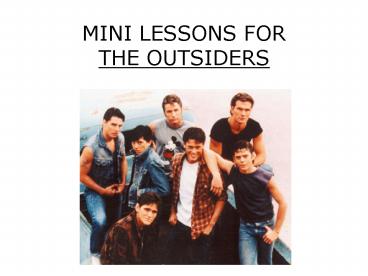MINI LESSONS FOR THE OUTSIDERS - PowerPoint PPT Presentation
1 / 4
Title:
MINI LESSONS FOR THE OUTSIDERS
Description:
MINI LESSONS FOR THE OUTSIDERS MINI LESSON # 1: POINT OF VIEW Point of View is the vantage point from which an author presents a story. Point of view is shaped by the ... – PowerPoint PPT presentation
Number of Views:190
Avg rating:3.0/5.0
Title: MINI LESSONS FOR THE OUTSIDERS
1
MINI LESSONS FOR THE OUTSIDERS
2
MINI LESSON 1 POINT OF VIEW
- Point of View is the vantage point from which an
author presents a story. Point of view is shaped
by the author's choice of narrator, the person
who tells the story. A story may be told from the
first-person point of view or the third-person
point of view. The use of the third-person
pronouns she, he, they, him, and her signals that
a story is told from the third-person point of
view. The use of the pronoun I indicates the
first-person point of view. - First-person Point of View
- Stories told in the first-person point of view
use I, me, our, we, or my. The narrator is a
character in the story, usually but not always
the main character. A story told from one
person's point of view limits that character's
knowledge to his or her own observations and
ideas. Not all narrators are reliable, so they
may be biased in their view of characters or
events. You must judge whether someone is a
reliable narrator based on other details from the
story. - Third-person Point of View
- Told by a narrator who is not a part of the
story's action, the thirdperson point of view
uses pronouns such as he, she, and they. If the
third-person narrator appears to know what
everyone in the story is thinking and feeling,
the point of view is called omniscient. Most
stories, however, limit the narrator's knowledge
to what the protagonist thinks and feels. Such a
point of view is called limited.
3
- The first-person narrator can be right or wrong
about the events of the story or the motives of
the other characters he can tell the truth, or
lie he can understand the story, or he may not
his hopes, dreams, fears, prejudices in short,
his emotional and psychological qualities all
are taken into account by the reader in
interpreting what is being told by the narrator.
This complexity makes first person an extremely
vivid and lifelike means of narration.
4
ASSIGNMENT
- Ponyboy is the narrator of The Outsiders.
What internal conflicts does he face? What
external conflicts? What does he consider to be
unique about himself? At this point in the
novel, do you think he is comfortable with the
person that he is? Support your answer with
references to the text. - Is Ponyboy a reliable narrator? Consider
his maturity and his view of his situation in
life. What bias does he bring to our
understanding of the story? Do you agree with his
perception of the situations he finds himself in.































